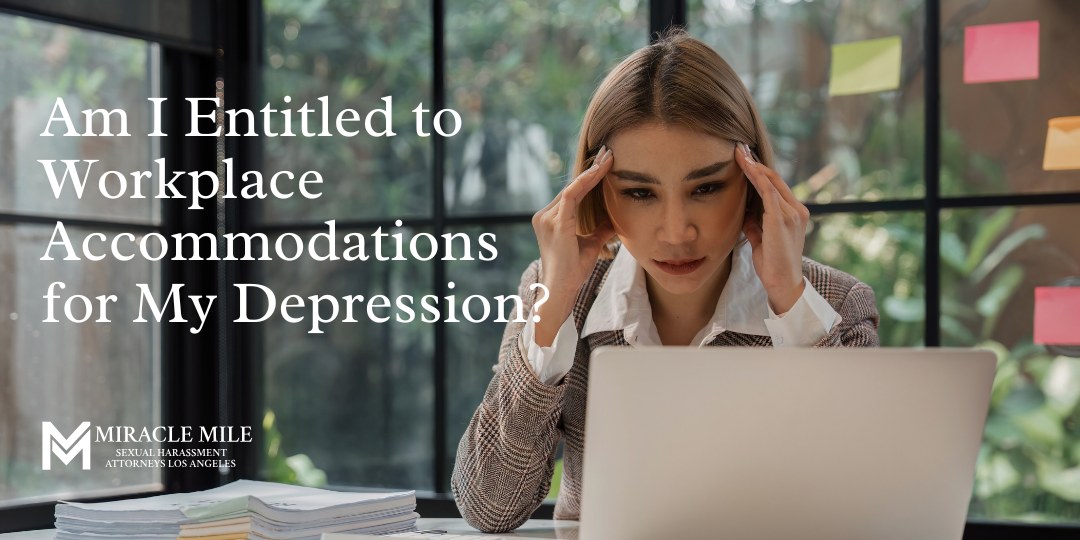
Am I Entitled to Workplace Accommodations for My Depression?
Depression is a serious mental health condition that affects millions of people, including many employees across California. If you are struggling with symptoms of depression that make it difficult to perform your job, you may be wondering whether your employer is obligated to support you through reasonable accommodations. The good news is that both federal and state laws provide protections for workers with mental health conditions, including depression. As a California employee, you have the right to request accommodations that enable you to continue working without compromising your health.
What Is a Workplace Accommodation?
A workplace accommodation is any change or adjustment in the work environment or job duties that enables an employee with a disability to perform the essential functions of their job. Accommodations can involve modifications to work schedules, tasks, communications, or the physical workspace. An accommodation is considered “reasonable” if it does not impose an undue hardship on the employer—meaning it does not require significant difficulty or expense, and it helps the employee carry out their job duties effectively. Depression, when it substantially limits a major life activity (such as thinking, concentrating, or working), may qualify as a disability, triggering the right to accommodations.
Legal Protections for Mental Health Conditions
In California, employees suffering from depression and other mental health conditions are protected under both federal and state laws:
- Americans with Disabilities Act (ADA): This federal law prohibits discrimination against individuals with disabilities and requires covered employers to provide reasonable accommodations. The ADA applies to employers with 15 or more employees.
- California Fair Employment and Housing Act (FEHA): FEHA is California’s more expansive anti-discrimination law. It offers broader protections than the ADA and applies to employers with five or more employees. Under FEHA, a mental health condition such as depression qualifies as a disability if it limits a major life activity.
Both laws prohibit employers from discriminating against employees based on their disability and require them to engage in an “interactive process” to determine appropriate accommodations.
Examples of Reasonable Accommodations for Depression
Accommodations for depression focus on helping the employee perform their job while managing their health condition. Some common accommodations include:
| Type of Accommodation | Description |
|---|---|
| Flexible Schedule | Allows the employee to start or end work at different times to manage symptoms or attend therapy sessions. |
| Remote Work | Permits the employee to work from home to reduce stress or manage fatigue. |
| Extra Breaks | Provides additional breaks throughout the day to cope with emotional or mental fatigue. |
| Modified Workload | Temporarily reduces the volume or intensity of tasks to lessen stress during difficult periods. |
| Quiet Workspace | Assigns a space with less noise and fewer distractions to help the employee focus. |
| Job Restructuring | Adjusts certain non-essential job duties to accommodate the employee’s limitations. |
These accommodations are not exhaustive, and your situation may call for a customized solution. The right accommodation will depend on your specific needs, job responsibilities, and the employer’s operational capacity.
How to Request an Accommodation at Work
If you need a workplace accommodation due to depression, follow these steps:
- Notify Your Employer: You are not required to disclose your medical diagnosis in detail, but you must inform your employer that you have a condition that requires an accommodation. This can be done verbally or in writing; however, written requests create a paper trail.
- Provide Supporting Documentation: Your employer may request documentation from a healthcare provider confirming that you have a qualifying condition and recommending accommodations. This documentation should focus on limitations, not detailed medical history.
- Engage in the Interactive Process: Under both the ADA and FEHA, employers must engage in an ongoing, good-faith dialogue with you to determine a reasonable accommodation. This is known as the “interactive process.”
- Document Everything: Keep copies of all communications with your employer regarding your request. If there is a dispute later, these records can be critical to proving your claims.
What Employers Can and Cannot Do
While employers are obligated to provide reasonable accommodations, there are boundaries to what is legally required:
What Employers CAN Do:
- Ask for medical documentation verifying the need for an accommodation.
- Propose alternative accommodations if your request creates an undue hardship.
- Monitor performance without discriminating or retaliating.
What Employers CANNOT Do:
- Deny a reasonable accommodation outright without a legitimate reason.
- Discriminate against you or treat you differently because of your depression.
- Retaliate against you for requesting an accommodation or asserting your rights.
- Disclose your medical condition to colleagues or others without your consent.
If your employer refuses to accommodate you or treats you unfairly after you disclose your condition, this may constitute disability discrimination under California law.
When to Speak with an Employment Lawyer
If your employer denies your accommodation request, retaliates against you, or creates a hostile work environment because of your depression, it may be time to consult with an experienced employment lawyer. At Miracle Mile Law Group, we help employees across California understand and assert their rights under the ADA and FEHA. Whether you are facing denial of accommodations, wrongful termination, or discrimination, we can advocate for you and hold your employer accountable. You don’t have to navigate this process alone.
Visit our page on Disability Discrimination to learn more about your protections and how we can help.
Conclusion
Depression is not a weakness, and it is your legal right to seek accommodations that help you maintain both your mental health and your career. California law recognizes mental health-related disabilities and provides strong protections for workers who need support. If you are struggling at work due to your depression, a workplace accommodation could make a significant difference. Know your rights, advocate for yourself, and don’t hesitate to contact Miracle Mile Law Group if you need legal assistance. We’re here to help you protect your future.


